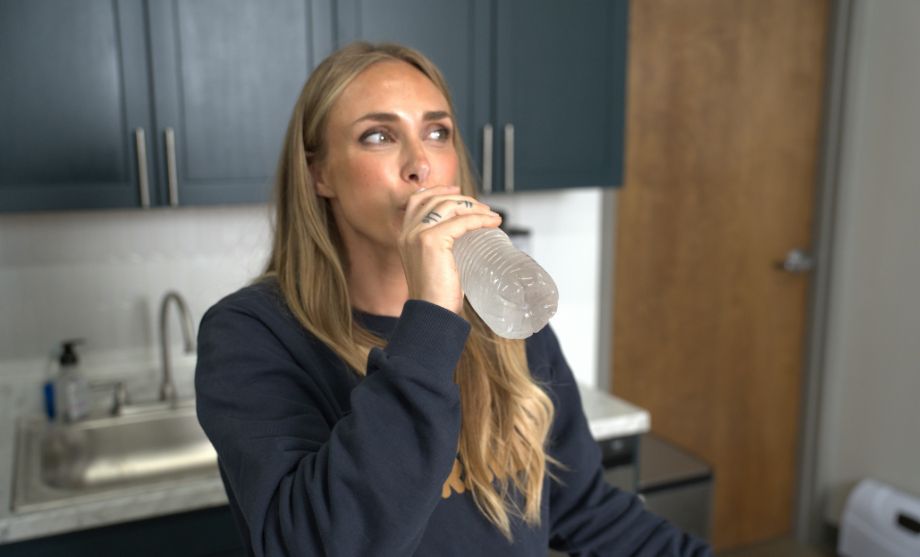We test and review fitness products based on an independent, multi-point methodology. If you use our links to purchase something, we may earn a commission. Read our disclosures.
It’s a question as old as time, yet it still seems to baffle us: How much water should you drink a day? The golden rule of water consumption is eight glasses per day. While this is a good rule of thumb, there’s a lot that goes into it. Your body’s water needs depend on various factors such as activity level, age, sex, and much more.
RELATED: Best Electrolyte Powder
Perhaps you’re constantly struggling to drink enough water, or you’re a gym rat who carries around a gallon of water everywhere you go. Either way, this article will explore why drinking water is important and help you make sure you’re drinking enough water.
Medical disclaimer: This article is intended for educational and informational purposes only. It is not intended as a substitute for medical advice. For health advice, contact a licensed healthcare provider.
Benefits of Drinking More Water
If you’ve seen “Dune,” then you know water is life. So, before we get into ideal water intake levels, here are some of the benefits of proper hydration:
- Acts as a solvent to transport nutrients, like electrolytes, through the blood
- Regulates body temperature
- Keeps skin hydrated
- Promotes healthy kidney and organ function
- Circulates and removes waste through urine
- Lubricates joints and soft tissues
Put another way, adequate hydration is crucial to the proper functioning of body tissues, metabolic processes, and brain health, according to the CDC. In fact, a review published in 20201 showed that underhydration is associated with poor health conditions in certain populations.
How Much Water Should You Drink a Day?
So, what is the ideal daily water intake? Well, the answer depends on many factors. Below are recommendations for water intake to ensure proper hydration in healthy people, based on findings from a 2018 study2 that evaluated water intake across America:
- Adult women: 2.7 liters (11.5 cups of water, or 91 ounces)
- Pregnant women: 3 liters (12.7 cups, or 101 ounces)
- Breastfeeding women: 3.8 liters (16 cups, or 128 ounces)
- Adult men: 3.7 liters (15.5 cups, or 125 ounces)
Older people will need roughly the same amount of water as above2.
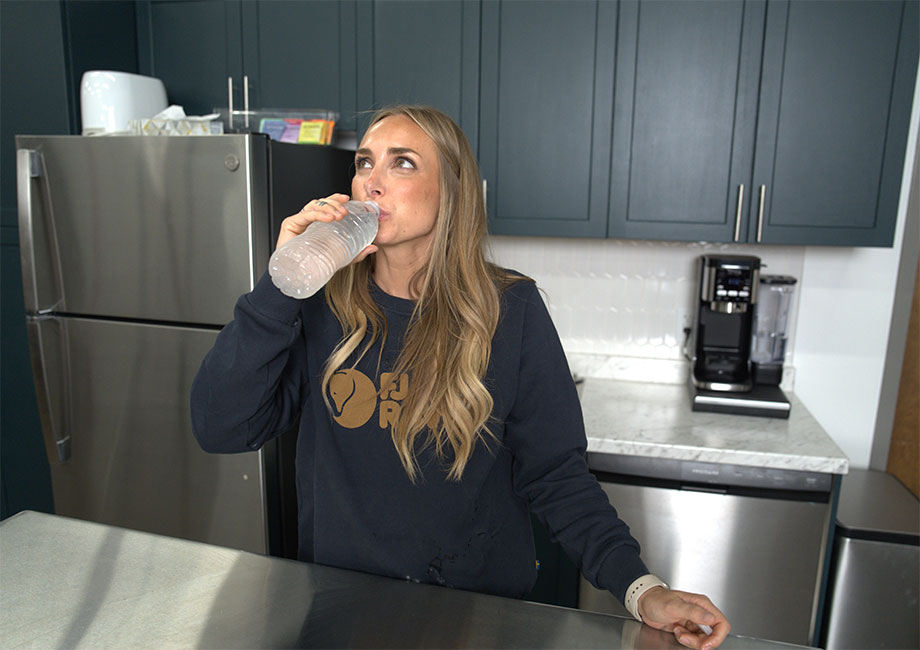
Thirst typically (and poorly) drives fluid intake3. Specific water needs will vary from person to person and depend on a variety of factors, but the most important are the following:
- Gender: In general, men tend to need more water than women2. That said, women who are pregnant or breastfeeding will need extra water3.
- Physical activity: Exercising and simply being more active means greater fluid loss due to sweating and metabolic processes. The National Athletic Trainers Association recommends increased water intake during physical activity4 to prevent dehydration and hyperthermia.
- Body composition: The bigger you are, the greater your body’s water needs. How much more really depends on your activity level and gender. That said, a study published in 20235 showed that lower body weight was associated with increased water intake. This isn’t to say that drinking less water leads to weight gain, or that drinking more leads to weight loss. Several factors influence excess body weight6.
- Age: Believe it or not, hydration needs change with age. Kids need less than adults. As you get older, water intake and hydration are more difficult to maintain. Neurological decline7, muscle wasting, and impaired kidney function all contribute to reduced fluid intake8.
- Illness: Fevers and colds can cause dehydration and impaired water intake. More serious conditions, like high blood pressure or obesity, can dramatically impact how much water your body needs3.
A lot of factors influence how much water we need. Keep in mind that 20% to 30% of your total water intake will come from food. After that, eight glasses of water a day (the equivalent of a couple of water bottles) is a good place to start. Keep a water bottle handy, and drink when you’re thirsty.
RELATED: Propel Electrolyte Water Beverage Mix
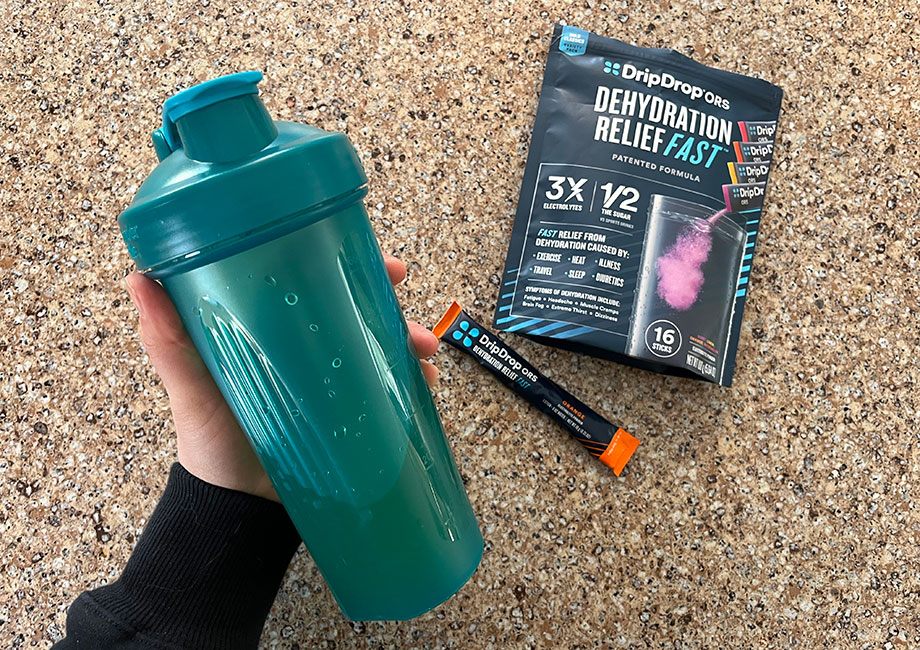
How to Tell If You Need to Drink More Water
If you have to ask if you’re drinking enough water, then you probably aren’t. Here are some ways to tell if you’re not drinking enough water.
- Urine color: Pay attention the next time you pee. In general, urine color may be a good indicator9 of hydration. Dark brown to yellow urine probably means you aren’t drinking enough fluid. Pale yellow to clear urine is a good indicator you are.
- Urine frequency: Also check your urine volume and frequency. If you pee infrequently, like once or less per day, and/or you only pee a small amount, you probably need to drink more water.
- Signs of dehydration: Dark urine, dry mouth, headaches, cramping, infrequent urination, and constipation are some major signs you’re not drinking enough. If any of these apply to you, check your hydration levels. If they persist, you might want to see a medical professional. Chronic dehydration10 is associated with an increased risk of urinary tract infections, kidney stones, and even heart failure.
How to Tell If You Are Drinking Too Much Water
While your body needs water to function properly, too much water can also be a problem. Again, let your pee be your guide.
Clear urine is a good sign you’re drinking enough water, but it may be deceptive. If you’re urinating more than once per hour and in large volumes, that’s probably a good sign you’re drinking too much water.
Bloating is another sign of excessive water intake. If you feel bloated and full even in between meals, you may be drinking too much water.
Excessive water intake can cause hyponatremia. This is when your kidneys filter out too much sodium, which is important for nerve and muscle function, among other things. Though rare, hyponatremia is life-threatening. Case in point—gallons of water per day don’t equate to optimal health benefits.
I won’t say you should drink a lot of water just for the sake of drinking water, but you should be drinking enough water to match your body composition and level of physical activity.
Tips for Increasing Your Water Intake
I’m a runner and cyclist who lives in Virginia, and the Southeast summers are enough to remind me to drink water. That said, not everyone has a super strong thirst drive. The average American’s water intake is inadequate, and is even worse when we account for socio-economic factors11.
That said, here are some tips to boost your water intake, which can increase hydration and your overall health.
Always Carry a Water Bottle
Wherever I go, I carry a backpack that has my chapstick, a snack bar, and a water bottle. I know I’ll be thirsty and if I have extra water on me, I don’t have to plan any detours.
Use Apps To Track Your Intake
Apps like MyFitnessPal can help you track your water and food intake and exercise activity. If you frequently forget to drink water, apps like the Water Reminder app can alert you when it’s time to take a few swigs from your water bottle.
Drink Sports Drinks or Flavored Water
Sports drinks are geared toward athletes, as the beverages have sugar and electrolytes that highly active individuals need. But the best sports drinks taste good, and that can make drinking enough fluids more enjoyable.
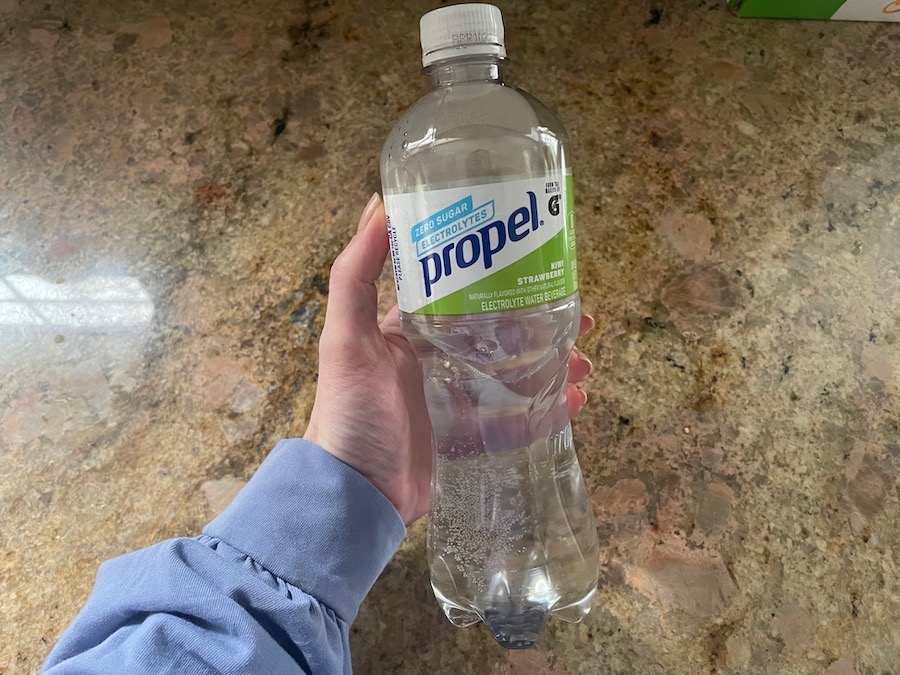
Don’t go crazy, though—unless you work out for several hours a day, you likely don’t need as much sugar and carbs as a professional athlete. My advice is to mix your sports drink with plain water so you can stretch it out a bit. You can also try a homemade electrolyte drink to jazz up your water.
Add Some Flavor
If you’re pretty active and want to combine fluid intake with your protein, you might be interested in a beverage like Ascent Recovery Water. You can also use flavored water drops, add a BCAA supplement to your water, or infuse your water with fresh fruit.
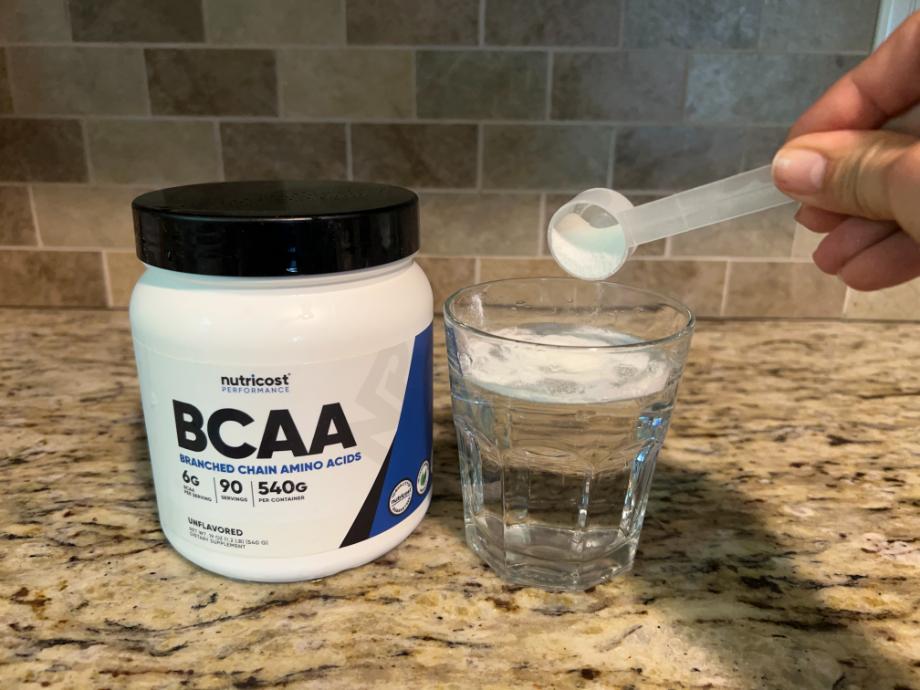
Reconsider Caffeinated Beverages
There’s a popular myth that coffee and sodas make you pee more frequently, which can lead to dehydration. True, caffeine is a diuretic, which promotes water loss. But according to the Mayo Clinic, the jury is out on whether caffeinated drinks actually contribute to dehydration or not.
Eat Fruits and Vegetables
Foods like watermelon, grapes, and berries have a high water content, which contributes to overall hydration, not to mention a host of other health benefits.
Finally, consider that increased water intake is associated with weight loss while dieting12. I’m not saying you should go on a water fast. But if you struggle with your weight, this may be a good incentive to drink more water. Please speak to a dietitian before considering extreme calorie restriction.
Your best bet is to simply pay attention to how much water you drink, figure out what your body needs, and be proactive. Drink water when you’re thirsty, and always have some on hand.
How Much Water Should You Drink a Day: Final Thoughts
Proper water intake is crucial to maintain overall health and exercise performance. Water truly is life. Here are a few key things to remember when determining how much water you should drink a day:
- Hydration depends on gender, body type, and activity level.
- Drink between 2 liters (for women) and 3 liters (for men) per day, or around eight glasses of water per day.
- Know how to check your hydration by examining your urine color. Dark brown to yellow likely means you’re not hydrated enough. Also pay attention to how frequently you pee. Healthy people should be urinating about once every hour or so.
- Foods with a high water content can promote hydration and have tons of other health benefits.
- Coffee and tea may make you pee, resulting in water loss, but they can contribute to your overall hydration. Sodas aren’t ideal, so try to swap a can of cola for a cup of water.
- Drink often throughout the day. Add flavorings, or try protein water.
You would think drinking water would be so simple. It’s everywhere. It’s what the body wants. And yet, here we are. Don’t stress. There are plenty of ways for you to drink in good health.
How Much Water Should You Drink a Day: FAQs
How many ounces of water should you drink per day?
Men should drink about 125 ounces, or 15 cups, of water per day. Women should drink about 90 ounces, or 11.5 cups, of water per day. If that sounds like too much, try to shoot for about eight cups per day. Also, keep in mind that the amount of water you need is highly individual. You may need more or less depending on your activity levels, body composition, and other health conditions.
How much water should you drink based on your weight?
The guidelines of about 125 ounces of water per day for men and 91 ounces for women are based on a body weight of 88 kilograms or about 194 pounds (for men) and 64 kilograms or about 141 pounds (for women). You should aim to drink ~500 milliliters (~2.5 cups) more per every additional 15 pounds11.
Is a gallon of water a day too much?
Probably, considering you also get water from food. For men, 3.7 liters per day will ensure optimal hydration. For women, it’s 2.5 liters. That’s well below a gallon. If you insist on drinking more water, be sure to mix in some electrolytes to keep those in check.
References
- Stookey JD, Kavouras SA, Suh H, Lang F. Underhydration Is Associated with Obesity, Chronic Diseases, and Death Within 3 to 6 Years in the U.S. Population Aged 51–70 Years. Nutrients. 2020; 12(4):905. https://doi.org/10.3390/nu12040905
- Armstrong LE, Johnson EC. Water Intake, Water Balance, and the Elusive Daily Water Requirement. Nutrients. 2018 Dec 5;10(12):1928. doi: 10.3390/nu10121928. PMID: 30563134; PMCID: PMC6315424.
- Widjaja Lukito; Current Evidence in Water and Hydration Science. Ann Nutr Metab 28 December 2021; 77 (Suppl. 4): 1–6. https://doi.org/10.1159/000521769
- McDermott BP, Anderson SA, Armstrong LE, Casa DJ, Cheuvront SN, Cooper L, Kenney WL, O’Connor FG, Roberts WO. National Athletic Trainers’ Association Position Statement: Fluid Replacement for the Physically Active. J Athl Train. 2017 Sep;52(9):877-895. doi: 10.4085/1062-6050-52.9.02. PMID: 28985128; PMCID: PMC5634236.
- Clayton P, Trak-Fellermeier MA, Macchi A, Galván R, Bursac Z, Huffman-Ercanli F, Liuzzi J, Palacios C. The association between hydration status and body composition in healthy children and adolescents. J Pediatr Endocrinol Metab. 2023 Apr 4;36(5):470-477. doi: 10.1515/jpem-2022-0462. PMID: 37006164; PMCID: PMC10174625.
- Han JC, Lawlor DA, Kimm SY. Childhood obesity. Lancet. 2010 May 15;375(9727):1737-48. doi: 10.1016/S0140-6736(10)60171-7. Epub 2010 May 5. PMID: 20451244; PMCID: PMC3073855.
- Hardy J, Revesz T. The spread of neurodegenerative disease. N Engl J Med. 2012 May 31;366(22):2126-8. doi: 10.1056/NEJMcibr1202401. PMID: 22646635.
- Abdallah L, Remington R, Houde S, Zhan L, Melillo KD. Dehydration reduction in community-dwelling older adults: perspectives of community health care providers. Res Gerontol Nurs. 2009 Jan;2(1):49-57. doi: 10.3928/19404921-20090101-01. PMID: 20077993.
- Armstrong LE, Maresh CM, Castellani JW, Bergeron MF, Kenefick RW, LaGasse KE, Riebe D. Urinary indices of hydration status. Int J Sport Nutr. 1994 Sep;4(3):265-79. doi: 10.1123/ijsn.4.3.265. PMID: 7987361.
- Popkin BM, D’Anci KE, Rosenberg IH. Water, hydration, and health. Nutr Rev. 2010 Aug;68(8):439-58. doi: 10.1111/j.1753-4887.2010.00304.x. PMID: 20646222; PMCID: PMC2908954.
- Dolci, A., Vanhaecke, T., Qiu, J. et al. Personalized prediction of optimal water intake in adult population by blended use of machine learning and clinical data. Sci Rep 12, 19692 (2022). https://doi.org/10.1038/s41598-022-21869-y
- Stookey JD, Constant F, Popkin BM, Gardner CD. Drinking water is associated with weight loss in overweight dieting women independent of diet and activity. Obesity (Silver Spring). 2008 Nov;16(11):2481-8. doi: 10.1038/oby.2008.409. Epub 2008 Sep 11. PMID: 18787524.
Further reading

Your search for the best recumbent exercise bike ends here with our roundup of picks selected by certified personal trainers. Read more

The Trap Bar is one of the most popular specialty bars on the market. Most commercial gyms in the country have one and a majority of home and garage gyms should have one. In order to help you decide whether it would benefit your training, we have come up with seven reasons and benefits for the trap bar including our most popular recommendations. Read more

Looking for a NOBULL discount code? We have all of the best NOBULL coupons and codes here. Read more

Got a stack of weight plates just lying around? Our Rogue DB-15 Loadable Dumbbell review will let you know why this is the perfect piece of equipment for your home gym. Read more

